
ITI Trade: Machinist
Powered by: NCVT (National Council for Vocational Training)
Course Duration: 2 Years (Four Semesters)
NSQF Level: 5
Mode: Full-time
Overview
The Machinist Trade under the Craftsmen Training Scheme (CTS) is a job-oriented course powered by NCVT. It is tailored for those aspiring for both government and private sector jobs, and is highly suitable for self-employment as well. This trade is designed to fulfill the industrial workforce requirements of Indian and international industries.
The program equips students with hands-on skills in operating and maintaining different types of power-driven metal cutting and grinding machines, making it ideal for employment in production and manufacturing industries, infrastructure projects, defense organizations, and more.
On successful completion of this course, candidates will be gainfully employed as:
- Machinists
- Grinders
- Operators of metal cutting and grinding machines
- Skilled workers in various industrial sectors
Scope & Career Opportunities
Machinists have a wide scope of employability, including:
- Self-employment
- Contractual employment
- Government and Private Industrial jobs
Industries Employing Machinists:
- Production & Manufacturing Units
- Aerospace & Defense Organizations
- Railways & Metro Projects
- Infrastructure & Construction Projects
- Oil & Gas Refineries
- Automobile & Heavy Engineering Industries
International Comparability
- The Machinist trade syllabus is 95% aligned with the German training system, ensuring international standards in training.
- ITI Machinist graduates have been successfully employed in countries like:
- Gulf Countries
- European Nations
- Australia & New Zealand
- Singapore, etc.
Progression Pathways
After completing this course, candidates can pursue higher education and career advancements:
- 10+2 Certification via National Institute of Open Schooling (NIOS), enabling them to pursue higher secondary education.
- Lateral Entry into Diploma Courses in related engineering disciplines.
- Supervisory Roles after pursuing part-time or full-time diplomas in relevant engineering fields.
- Apprenticeship Programs in various industries, leading to the National Apprenticeship Certificate (NAC).
- Crafts Instructor Training Scheme (CITS) for becoming Vocational Instructors at ITIs and other training institutions.
Semester-wise Curriculum & Learning Outcomes
Semester – I
- Basic Fitting Operations: Marking, Hacksawing, Chiseling, Filing, Drilling, Tapping, etc.
- Component Production: Drilling, Reaming, Tapping, Dieing with accuracy using Vernier Calipers, Micrometer, etc.
- Assembly Work: Sliding, Angular, Step fits with required tolerance.
- Lathe Machine Operations: Setting jobs on 3-jaw/4-jaw chucks, performing turning operations.
- Cutting Tool Preparation: Sharpening and preparing tools for turning jobs.
- Component Assembly: Producing taper/angled components and ensuring their proper assembly.
- Threading Operations: Producing metric threads and assembling components.
Semester – II
- Slotting Operations: Preparing concave/convex surfaces, internal keyways.
- Milling Operations: Plain, face, angular, gang, and straddle milling.
- Advanced Threading: Producing square and "V" threads.
- Precision Grinding: Surface and cylindrical grinding to ±0.01 mm accuracy.
Semester – III
- Tool Resharpening: Single and multipoint cutting tools, milling cutters.
- Complex Milling Operations: Rack cutting, Spur gear, External spline, etc.
- Industrial Electrical Applications: Multimeter, transformers, relays, solenoids, motors, gearboxes.
- CNC Turning Center: Programming and operating CNC turning machines to produce precision components.
Semester – IV
- CNC Machining Center: Programming and operation to produce intricate components.
- Machine Overhauling & Repairs: Drilling, milling, lathe machines, checking functionality.
- Advanced Milling Components: Bevel gears, cams, worms & worm wheels.
Generic Learning Outcomes
- Safety & Environmental Compliance: Work safely, follow environmental guidelines, and maintain cleanliness.
- Math & Science Applications: Use algebra, geometry, trigonometry, and basic electrical principles in trade work.
- Engineering Drawing Interpretation: Understand geometrical construction, layout, projection, and scale.
- Measuring & Inspection: Select and use appropriate measuring tools for dimensional checks and quality assurance.
- Productivity & Quality Awareness: Apply productivity techniques, quality tools, and understand labor welfare policies.
- Energy & Environmental Awareness: Understand energy conservation, global warming, and pollution control practices.
- Entrepreneurship & Finance: Manage personal finances, develop entrepreneurial skills, and contribute to societal growth.
- Work Planning & Organization: Effectively plan and execute trade-related tasks.
Key Features
- Job-Oriented & Industry-Relevant Curriculum
- Hands-On Practical Training on Advanced Machines
- CNC Programming & Operation Skills
- Precision Machining with High-Accuracy Tolerances
- Opportunities for Global Employment
- Pathway to Further Education and Career Progression
Eligibility
- Qualification: 10th Pass
- Age Limit: 14 - 40 years (Varies by state/ITI policy)
Certification
Upon successful completion, trainees receive a National Trade Certificate (NTC) issued by NCVT, recognized both in India and abroad.
